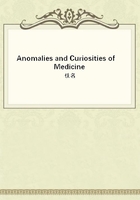
第52章
Shortt says that one day, while crossing the esplanade at Villaire, between seven and eight o'clock in the morning, he perceived three Hindoo women with large baskets of cakes of "bratties" on their heads, coming from a village about four miles distant. Suddenly one of the women stood still for a minute, stooped, and to his surprise dropped a fully developed male child to the ground. One of her companions ran into the town, about 100yards distant, for a knife to divide the cord. A few of the female passers-by formed a screen about the mother with their clothes, and the cord was divided. The after-birth came away, and the woman was removed to the town. It was afterward discovered that she was the mother of two children, was twenty-eight years old, had not the slightest sign of approaching labor, and was not aware of parturition until she actually felt the child between her thighs.
Smith of Madras, in 1862, says he was hastily summoned to see an English lady who had borne a child without the slightest warning.
He found the child, which had been born ten minutes, lying close to the mother's body, with the funis uncut. The native female maid, at the lady's orders, had left the child untouched, lifting the bed-clothes to give it air. The lady said that she arose at 5.30 feeling well, and during the forenoon had walked down a long flight of steps across a walk to a small summer-house within the enclosure of her grounds. Feeling a little tired, she had lain down on her bed, and soon experienced a slight discomfort, and was under the impression that something solid and warm was lying in contact with her person. She directed the servant to look below the bed-clothes, and then a female child was discovered.
Her other labors had extended over six hours, and were preceded by all the signs distinctive of childbirth, which fact attaches additional interest to the case. The ultimate fate of the child is not mentioned. Smith quotes Wilson, who said he was called to see a woman who was delivered without pain while walking about the house. He found the child on the floor with its umbilical cord torn across.
Langston mentions the case of a woman, twenty-three, who, between 4 and 5 A.M., felt griping pains in the abdomen. Knowing her condition she suspected labor, and determined to go to a friend's house where she could be confined in safety. She had a distance of about 600 yards to go, and when she was about half way she was delivered in an upright position of a child, which fell on the pavement and ruptured its funis in the fall. Shortly after, the placenta was expelled, and she proceeded on her journey, carrying the child in her arms. At 5.50 the physician saw the woman in bed, looking well and free from pain, but complaining of being cold. The child, which was her first, was healthy, well nourished, and normal, with the exception of a slight ecchymosis of the parietal bone on the left side. The funis was lacerated transversely four inches from the umbilicus. Both mother and child progressed favorably. Doubtless the intense cold had so contracted the blood-vessels as to prevent fatal hemorrhage to mother and child. This case has a legal bearing in the supposition that the child had been killed in the fall.
There is reported the case of a woman in Wales, who, while walking with her husband, was suddenly seized with pains, and would have been delivered by the wayside but for the timely help of Madame Patti, the celebrated diva, who was driving by, and who took the woman in her carriage to her palatial residence close by. It was to be christened in a few days with an appropriate name in remembrance of the occasion. Coleman met an instance in a married woman, who without the slightest warning was delivered of a child while standing near a window in her bedroom. The child fell to the floor and ruptured the cord about one inch from the umbilicus, but with speedy attention the happiest results were attained. Twitchell has an example in the case of a young woman of seventeen, who was suddenly delivered of a child while ironing some clothes. The cord in this case was also ruptured, but the child sustained no injury. Taylor quotes the description of a child who died from an injury to the head caused by dropping from the mother at an unexpected time, while she was in the erect position; he also speaks of a parallel case on record.
Unusual Places of Birth.--Besides those mentioned, the other awkward positions in which a child may be born are so numerous and diversified that mention of only a few can be made here.
Colton tells of a painless labor in an Irish girl of twenty-three, who felt a desire to urinate, and while seated on the chamber dropped a child. She never felt a labor-pain, and twelve days afterward rode 20 miles over a rough road to go to her baby's funeral. Leonhard describes the case of a mother of thirty-seven, who had borne six children alive, who was pregnant for the tenth time, and who had miscalculated her pregnancy.
During pregnancy she had an attack of small-pox and suffered all through pregnancy with constipation. She had taken a laxative, and when returning to bed from stool was surprised to find herself attached to the stool by a band. The child in the vessel began to cry and was separated from the woman, who returned to bed and suddenly died one-half hour later. The mother was entirely unconscious of the delivery. Westphal mentions a delivery in a water-closet.